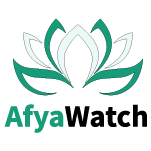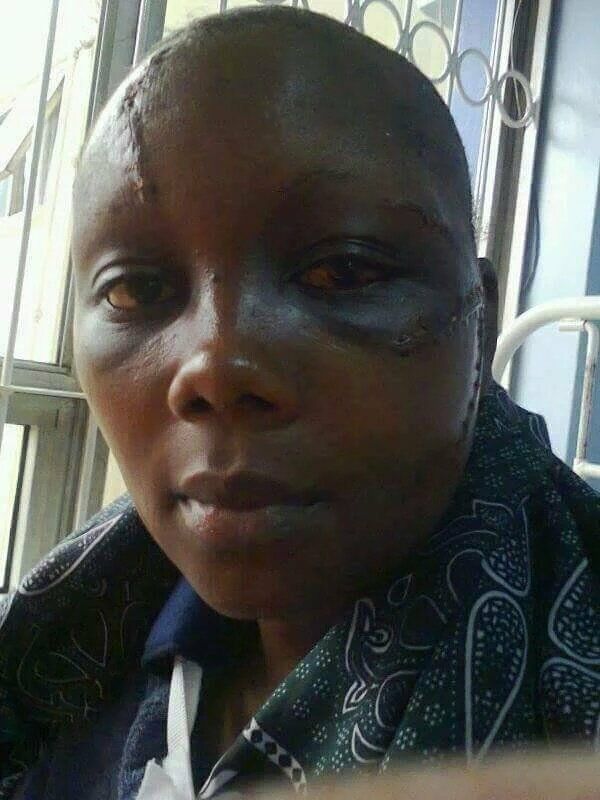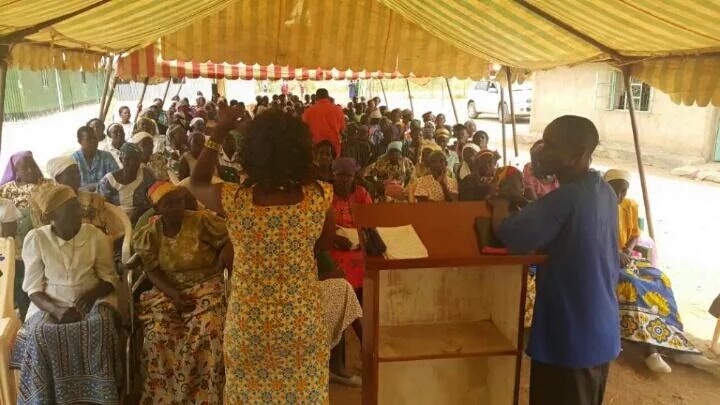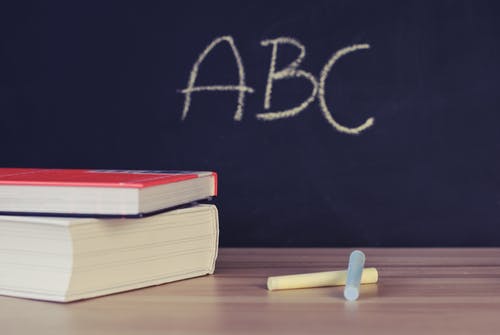A creeping sense of shame, a debilitating sense of loss, hopelessness and the realisation that pity parties would not yield the kind of justice I was seeking, jolted me to action. My story is not unique. You will understand why as you read on.
My name is Dianah Wanjiku Kamande. I am 35 years old and a mother of two girls, Praise Nyokabi and Cate Precious Wairimu. I am a widow.
The year was 2013. My husband of 10 years came home at night having hatched a plan to kill all of us. His attempts did not succeed. Frustrated that he could not kill us and under pressure to surrender to the police, he took his own life using a knife.
I survived with bad injuries and to date, I continue to bear the scars and the pain of the attack. I was fitted with 5 plastic nerves in my head. I underwent hand surgery and was fitted with multiple metal plates because he had broken my left hand.
Finally, after the second week in the hospital, I underwent a breast surgery because he had pierced my right breast.
To say I was in pain is to underestimate the kind of physical and psychological trauma that had me asking questions. Why? What happened? How is it that my husband of ten years turned against me and our children?
My scars are my guiding stars
I was devastated.
Lying in bed in the hospital, the visitors kept coming. It was then that I realised that many of my visitors were widows, others were survivors of domestic violence who had chosen the silent path.
Even as I nursed my wounds in utter devastation, I went through abuse. My in-laws accused me of being responsible for my husband’s death. I was insulted. They called me a prostitute. My household items were taken away. I was left scrounging as if I had never owned a sufuria in my life. It hurt so deep. It broke my trust in the system. When I turned to the law to see if I had any protection as a widow, there was no hope there too.
When I was discharged from the hospital, I invited a group of widows to my house. I had invited 15 of them. Instead, 25 showed up. I set out to reach out to widows. I told myself that my story should never be repeated in another woman’s life if I could do something about it. I made it my mission to be a beacon of hope.
Our second meeting had 66 widows. By the time we got to the third one, there were 337 widows. The numbers kept going up. I tried doing research on exactly how many widows there were in Kenya. Unfortunately, there are no statistics that indicate these numbers. It is almost as if there is a collective conscious to deny our existence. That too hurt deeply.
I embarked on a campaign in the media reaching out to widows. I was on radio, TV, social media platforms speaking boldly and unapologetically about widowhood. I wanted to break the culture of silence around widowhood. For me, who is a widow as a result of domestic violence, it can be traumatic.
The society viewed me as a bad woman who was violated because I was disobedient. My daughters had to carry this stigma too. Conversations were not in whispers. They were loud. Some people even stopped talking to me.
Living with scars was the toughest thing. I covered my face and head all the time. It took countless counselling sessions to come to terms with a face full of scars on one side, a scar on the forehead and metal plates in my left hand. I loathed the idea of foreign objects in my body. Living with a house help the rest of my life is what I had to accept because I cannot do any washing, ironing and other household chores without help.
It took time to accept that I could not change the past but I could change the future. I was the author of that future. I wanted to make it beautiful. When I sat down alone and thought about my future, it looked bright. I no longer see the scars. Now I see starts illuminating other peoples lives. I have since forgiven my husband. To get to this place where I am today is a dream that many victims of domestic violence harbour but do not achieve.
Domestic violence is ugly by its very nature. It creeps on you and eats you up convincing you the victim that you cannot speak up. Often, the overall feeling of embarrassment, inadequacy and shame can be overwhelming. The silence is like a victims class act. But it catches up with you and eats you up. I know this from speaking to those who have gone through it.
Domestic violence coupled with widowhood is not the kind of thing I would wish on anyone. Every time I get to speak out about these things, I speak them from a very personal place.
The challenges around widowhood are too many to ignore. The cultural practices and attitudes that condemn widows to a life of want must be banished from society.
Speaking up has come with its fair share of good surprises. My voice started getting support when few politicians and State Department of Gender recognized my work with widows.
I introduced a widows hashtag #WidowsRightsAreAlsoHumanRights. I went to all 47 counties in Kenya creating awareness on the plight of widows and championed for their rights.
We created support groups for widows where they started Loss and Grief sharing programmes, Economic Empowerment programmes, beadwork, Financial Training and free medical Camps to ensure widows know their health status. I turned all the challenges they told me to a bill on widowhood bill to protect widows against injustices.
I had started jotting down some of the things I wanted to be changed while in hospital.
Running my organization has taken a lot of personal sacrifices. I terminated my children’s education policy so that I could get the money to run the organization I founded, Come Together Widows and Orphans Organization. I still struggle to pay my children’s fees but I’m glad that hundreds of widows, survivors of violence and orphans are smiling because of my initiative.
I got widowed painfully, faced widow abuse and I purposed that nobody should go through the pain I went through. I am determined to bring change to my community.
16 Days of Activism
I’m involved in 16days of activism with widows because they go through a lot of silent GBV. Sometimes, it can get physical. The perpetrators are in-laws who violate the widow and her children. When a widow goes through GBV she may decide to run away. Often, she will leave without anything to start a new life shrouded in fear and poverty. Widow dispossession is real.
I have come across widows who, faced by a bleak future, marry off their under-age girls or send their boys to work and earn money. Conscripting your child to child-labour should not be a decision that a mother is forced to make because she is a widow or even divorced. These decisions form the vicious cycle of poverty that we must break by any means possible.
LESSONS LEARNT
- Any marriage certificate one signs during the wedding day is not a Death Warrant
- Leave an abusive marriage before its too late. Hospital ceilings are boring I was there for two months
- Perpetrators are always apologetic but remember they will do it again and again and apologize because habit is a disease.
- Society will always see the woman as the problem in case of violence. In my case, I live my life and let society continue its pathetic habit of judging that which it doesn’t know.













